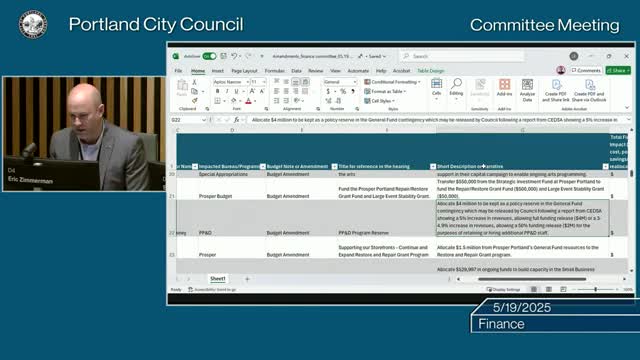Council discussions on budget restructuring and staff layoffs intensify in Portland
May 19, 2025 | Portland, Multnomah County, Oregon
This article was created by AI summarizing key points discussed. AI makes mistakes, so for full details and context, please refer to the video of the full meeting. Please report any errors so we can fix them. Report an error »

In the bustling chambers of Portland's City Hall, the Finance Committee convened on May 19, 2025, to tackle pressing budgetary concerns that could shape the city's economic landscape. As council members gathered, the atmosphere was charged with urgency, reflecting the weight of decisions that could impact jobs and community services.
A significant point of contention arose regarding the proposed budget amendments aimed at preventing layoffs within city departments. One councilor expressed skepticism about the city administrator's approach to restructuring, suggesting that the proposed contingency funds were insufficient. "This is another like, we're gonna do the big scary thing... but then we're gonna ask the council to bring this thing to save it at the last second," they remarked, highlighting a sense of frustration with the budgetary process.
The discussion shifted to the economic indicators that would trigger budget adjustments. Another councilor raised concerns that these indicators might not align with the city's current needs, suggesting that they could hinder efforts to stimulate economic growth. "I don't think there's a good odd that the economy as a whole is going to improve by this percentage," they noted, emphasizing the need for a more flexible approach to budgeting.
Amidst these discussions, the potential for a construction boom was also on the table, linked to the mayor and governor's System Development Charge (SDC) waiver. This could provide a much-needed boost to the local economy, but the councilors were cautious about relying solely on external factors for economic recovery.
As the meeting progressed, the conversation turned to the importance of retaining city staff. One councilor articulated a desire to delay layoffs for three months, allowing time to reassess the economic landscape and potentially save half of the positions at risk. "It gives us three months to figure out where things are actually headed in the city," they explained, underscoring the delicate balance between fiscal responsibility and community support.
The committee's discussions also touched on broader themes of resource generation, with calls for exploring new revenue streams through fee increases or budget cuts. Councilor Green emphasized the need to focus on what creates new resources, while also reserving time to discuss community support programs that had garnered public interest.
As the meeting drew to a close, the councilors were left with the weight of their decisions hanging in the air. The discussions reflected not only the immediate financial challenges facing Portland but also the broader implications for its residents and the city's future. With the clock ticking, the council's next steps would be crucial in navigating the complexities of budget management and community needs.
A significant point of contention arose regarding the proposed budget amendments aimed at preventing layoffs within city departments. One councilor expressed skepticism about the city administrator's approach to restructuring, suggesting that the proposed contingency funds were insufficient. "This is another like, we're gonna do the big scary thing... but then we're gonna ask the council to bring this thing to save it at the last second," they remarked, highlighting a sense of frustration with the budgetary process.
The discussion shifted to the economic indicators that would trigger budget adjustments. Another councilor raised concerns that these indicators might not align with the city's current needs, suggesting that they could hinder efforts to stimulate economic growth. "I don't think there's a good odd that the economy as a whole is going to improve by this percentage," they noted, emphasizing the need for a more flexible approach to budgeting.
Amidst these discussions, the potential for a construction boom was also on the table, linked to the mayor and governor's System Development Charge (SDC) waiver. This could provide a much-needed boost to the local economy, but the councilors were cautious about relying solely on external factors for economic recovery.
As the meeting progressed, the conversation turned to the importance of retaining city staff. One councilor articulated a desire to delay layoffs for three months, allowing time to reassess the economic landscape and potentially save half of the positions at risk. "It gives us three months to figure out where things are actually headed in the city," they explained, underscoring the delicate balance between fiscal responsibility and community support.
The committee's discussions also touched on broader themes of resource generation, with calls for exploring new revenue streams through fee increases or budget cuts. Councilor Green emphasized the need to focus on what creates new resources, while also reserving time to discuss community support programs that had garnered public interest.
As the meeting drew to a close, the councilors were left with the weight of their decisions hanging in the air. The discussions reflected not only the immediate financial challenges facing Portland but also the broader implications for its residents and the city's future. With the clock ticking, the council's next steps would be crucial in navigating the complexities of budget management and community needs.
View full meeting
This article is based on a recent meeting—watch the full video and explore the complete transcript for deeper insights into the discussion.
View full meeting
